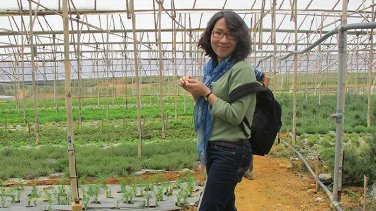Against all odds, a young Vietnamese woman is running her farm and shops that grow and offer local consumers fresh, clean organic vegetables.
Pham Phuong Thao, 33, owns a 1.8 hectare farm in southern Vietnam’s Dong Nai Province; a 1,200m2 garden which is home to vegetables typical of temperate climate in Da Lat in the Central Highlands province of Lam Dong; and two organic food shops in Ho Chi Minh City.
She has partnered with local farmers by selling their healthful produce, and investing in and harvesting farmers’ crops.
A graduate in environmental technology from a university in Hanoi, Thao came up with the idea of growing organic vegetables when she was three months pregnant.
“During the early months of my pregnancy, I was noxious all the time and ate mostly vegetables, especially uncooked one. I was concerned that the vegetables might not be clean and would adversely affect my baby. It was then that I drew up my plan to launch a healthful organic food store,” she shared.
During her trip to Laos, the young woman learned that organic food fairs were held in front of Pha That Luang Pagoda in Vientiane every Wednesday and Friday.
Farmers grew organic produce with the assistance of international non-governmental organizations and sold them to city dwellers and tourists at the fairs.
The question of why people in Laos, which is poorer than Vietnam, were given access to clean food, kept haunting her.
Thao began to work on her plan and launched a small shop called Organica, in Ho Chi Minh City’s District 3 last year.
The number of her items has jumped from around a dozen to now more than 300 of a wide variety.
Thao said that she always tries to sell as many certified organic products as possible. More than 70% of her items now are certified by reliable international agencies such as USDA of the US, and Ecocert of the EU.
One of her hurdles is that so far no Vietnamese agencies now provide organic certification to local farmers, while it’s quite costly and time-consuming to get the products certified by the international agencies.
Thao now grows her own organic vegetables on her farm and or on farms which her company has links with.
The businesswoman also finds persuading farmers on the farms she partners with to comply with organic vegetables growing procedures quite challenging.
Initially, most of the experienced farmers couldn’t understand why they had to grind chilies and garlic and ferment fruits to keep pest away, while all they need to do in conventional farming is spraying insecticide, which is more effective and much faster.
The farmers also found it troublesome to use cows’ waste, soy bean, and dried fish as fertilizers while so many brands of chemical fertilizers are available on the market.
They were also astonished that whenever the veggies contract diseases, Thao demands that all the vegetables be buried instead of “curing” them with pesticide.
Thao shared that gaining customers’ trust is also a daunting task. Several threaten to take legal actions against her if they find out that her products are not organic ones.
She has ceased operations of her own advertising and event organizing company to devote all her time to Organica.
“On bad days when fresh vegetables sell poorly, my staff and I have to cook them at home. But I remain undaunted and positive about a brighter future,” Thao shared.
Organica now has a regular clientele of over 200.
Thao’s company also has close contact with international distributors of organic food.
Recently Malaysia’s Health Paradise Organics, the first organic food distributor in the Southeast Asia paid a visit to Organica’s two shops, at 130 Nguyen Dinh Chieu, District 3, and P street in foreigner-packed Phu My Hung area’s Panorama in District 7. Thao hopes that such visits will help her company gain access to more internationally certified products and foreign clients.
Like us on Facebook or follow us on Twitter to get the latest news about Vietnam!




















































